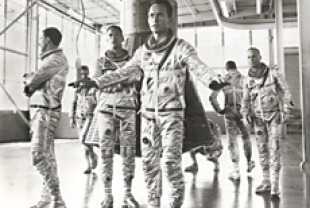This film, written and directed by Philip Kaufman, is based on Tom Wolfe’s 1979 book of the same title. Covering a time frame from 1942 through 1963, it presents a winning portrait of America’s entry into the Space Age by focusing on the astronauts, their wives, the NASA officials, the politicians, and the journalists who were involved in the awesome, funny, surreal, and heroic adventure. The drama ambitiously portrays some of the nation’s most persistent moral ambiguities — its love-hate relationship with technology, its thirst for idealized heroes, its insatiable hunger for new frontiers, and its somewhat contradictory notions about the value of teamwork and respect for rugged individualism. This innovative, engaging, and thematically rich film mixes documentary footage from the past with staged action and vivid special effects. The ensemble acting of a fine and large cast is commendable. The cinematography of Caleb Daschanel is superb.
In 1947, Chuck Yeager (Sam Shepard), an Air Force test pilot, becomes the first man to break the sound barrier, making his wife Glennis (Barbara Hershey) proud. Although the military decides not to publicize his triumph, Yeager is a hero to his peers, respected for his moxie and cool courage.
Newcomers at Edwards Air Force Base are “Gordo” (Dennis Quaid) and Trudy Cooper (Pamela Reed). They meet Gus (Fred Ward) and Betty Grissom (Veronica Cartwright) and Deke (Scott Paulin) and Marge Slayton (Mickey Crocker). As the young pilots risk new limits in the sky, the wives live in constant dread that their husbands will meet a fiery death in a place crash.
In 1957, America’s prestige in the world community is dealt a blow when Russia launches Sputnik, the world’s first satellite. President Eisenhower sets in motion a series of events leading to the formation of NASA and Project Mercury.
Chuck Yeager wants no part of the space program, claiming it turns pilots into “spam in a can.” But when the call goes out for astronauts, many of his peers sign up. Gordon Cooper, Virgil Grissom, and Donald Slayton are chosen. The rest of the original seven are Scott Carpenter (Charles Frank), John Glenn (Ed Harris), and Walter Schirra (Lance Henriksen).
The astronauts are instant media celebrities. A seven-man press squad is assigned to cover them and Life magazine wins exclusive rights to their stories. The men undergo exhausting physical and psychological tests. Bucking NASA’s “lab rabbit” approach, they bond together and win concessions that give them more control over the spacecraft that will take them aloft.
In 1960, an Atlas rocket explodes at Cape Canaveral. In the same year the Russians send the first man into outer space. The race with the Soviet Union is on. America’s hopes are raised when Alan Shepard’s suborbital flight is a success. President John F. Kennedy awards him the Congressional Medal of Honor and announces the nation’s goal of landing a man on the moon before the end of the decade.
On July 21, 1961, Gus Grissom duplicates Shepard’s flight in space, but an accident after landing in the ocean casts a shadow over the event. On February 20, 1962, John Glenn becomes the first American to orbit the earth. His triumph is a major one, and he is given a ticker-tape parade in New York City.
In 1962, the seven Project Mercury astronauts move to Houston where the new NASA Space Center is being completed. President Lyndon B. Johnson hosts a barbeque for them in the Houston Astrodome. Chuck Yeager, meanwhile, still teaches at Edwards Air Force Base. When he attempts to set a new altitude record, his plane experiences mechanical difficulties and he must eject himself from the aircraft.
In the final solo flight of Project Mercury, Gordon Cooper experiences the wonder of travel in outer space, and in his own way proves that individual valor can still shine forth from the collective efforts of NASA.
The special edition DVD contains audio commentaries with many of the film’s stars, including Ed Harris, Dennis Quaid, Scott Glenn, and Barbara Hershey, and with director Philip Kaufman, cinematographer Caleb Deschanel, and producers Irwin Winkler and Robert Chartoff. Featurettes focus on aspects of the production and on real-life astronaut and American hero John Glenn. Some deleted scenes are included.
